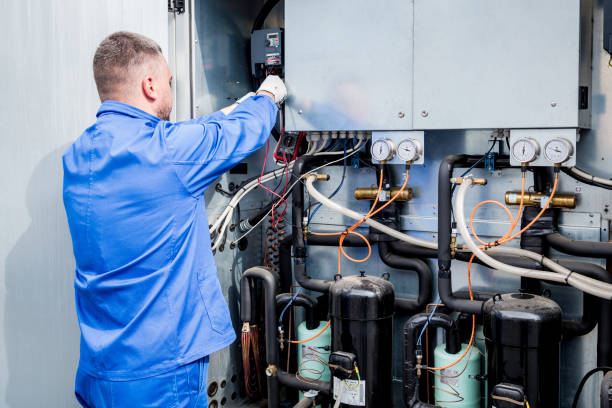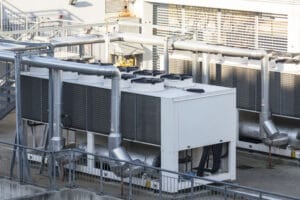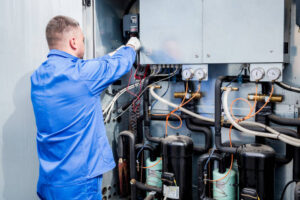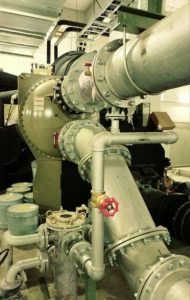Louisville Chiller Repair: Chillers are not exactly required in all commercial and industrial fields. But in some places, especially in the manufacturing processes, chillers become a necessity. However, it is a high-precision industrial-level machine, so even if a little joint is out of place, the entire machine might stop working. It is not that worrying, all you need to do is to call a professional repairman. But what are the signs you need Louisville Chiller Repair? Because identifying the exact cause can take time, which only professionals can do.
Nevertheless, here are the 6 reasons why you would need to call for Louisville chiller repair.
Improper Operating Practices:
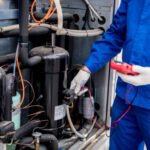 It is not uncommon to find out that your business might be conducting improper operating practices with your chiller. It is common sense that if you force the device to do something it was not supposed to do, it will break down sooner or later, and chillers are no different.
It is not uncommon to find out that your business might be conducting improper operating practices with your chiller. It is common sense that if you force the device to do something it was not supposed to do, it will break down sooner or later, and chillers are no different.
For instance, there have been cases where workers have tried to increase the chilled water flow rate, all for the purpose of increasing efficiency and output. The problem here is that the manufacturer has already set a proper flow rate that should not be exceeded. Otherwise, your chiller can corrode or simply break down.
Corrosion:
The chances of corrosion happening in your chiller are rather high. This is because chiller tubes are made out of copper, which is a highly susceptible material to rusting. There are high chances of heavy galvanic corrosion in tubes occurring if you have two metals being dissimilar. If this happens, the efficiency of the machine can decrease drastically. Also, the tubes are exposed to liquids a lot. In normal conditions, it might not be a problem, but poor water flows as well as sediment build-up bring their own problems like corrosion or perforation of tubes.
 Decrease In Performance:
Decrease In Performance:
Again, chillers are high-precision heavy-duty industrial machines. A lot of components are used to build this particular device. Over time, many parts will get worn down even though there is still some time span left in its expiration. Experts recommend testing the efficiency levels of chillers every 8 years. If the efficiency and output levels are beyond acceptable, then it is time to look for proper Louisville chiller repair, and in worse cases, replacement.
Worn Electrical Components:
Again, chillers are made from lots of different components. Out of all them, the electrical parts are the most concerning parts. They will also get worn down just like every other part with prolonged use. The problem here is that worn-down electrical parts are much more dangerous than any other component. They will not just cause defaults and malfunctions, they would also cause dangerous accidents which could prove to be fatal to workers in the vicinity. To summarize, electrical parts are extremely dangerous and need Louisville Chiller Repair ASAP.
Widening Tolerances Between Moving Parts:
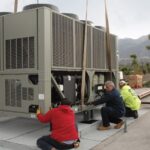 Friction is the bane of the existence of any two moving parts that are in contact. Because no matter how smooth they are, the friction still exists to cause problems. As a result, gaps could be created between these moving parts, which can widen with the passage of time. At one point, the gap would widen to such an extent that the chiller would start to malfunction, and would eventually break down. Such problems occurring in high precision machines such as chillers are dangerous. As such, Louisville chiller repair becomes necessary.
Friction is the bane of the existence of any two moving parts that are in contact. Because no matter how smooth they are, the friction still exists to cause problems. As a result, gaps could be created between these moving parts, which can widen with the passage of time. At one point, the gap would widen to such an extent that the chiller would start to malfunction, and would eventually break down. Such problems occurring in high precision machines such as chillers are dangerous. As such, Louisville chiller repair becomes necessary.
Corroded Heat-Transfer Surfaces:
Friction is not the only problem. You also have to contend with the heat transfer between the surfaces. This is because heat can also cause the corrosion of surfaces, specifically in the case of heat transfer. Not surprising, as extreme temperatures on both scales cause irreversible damage.
Contact us for Louisville Chiller Repair on call 24/7.
Address
7200 Distribution Dr, Louisville, KY 40258Phone: (502) 384-8500 Email: ACS.receptionist@AllianceComfortSys.com
Opening Hours
| Monday | 9:00 a.m. – 5:00 p.m. |
| Tuesday | 9:00 a.m. – 5:00 p.m. |
| Wednesday | 9:00 a.m. – 5:00 p.m. |
| Thursday | 9:00 a.m. – 5:00 p.m. |
| Friday | 9:00 a.m. – 5:00 p.m. |
| Saturday | Closed |
| Sunday | Closed |

